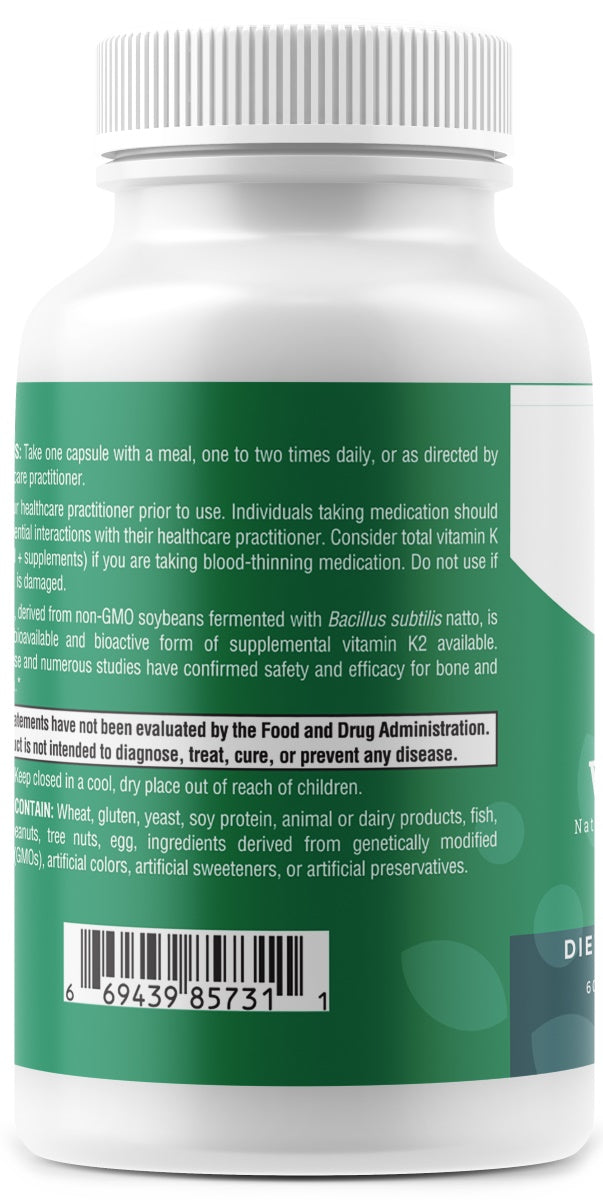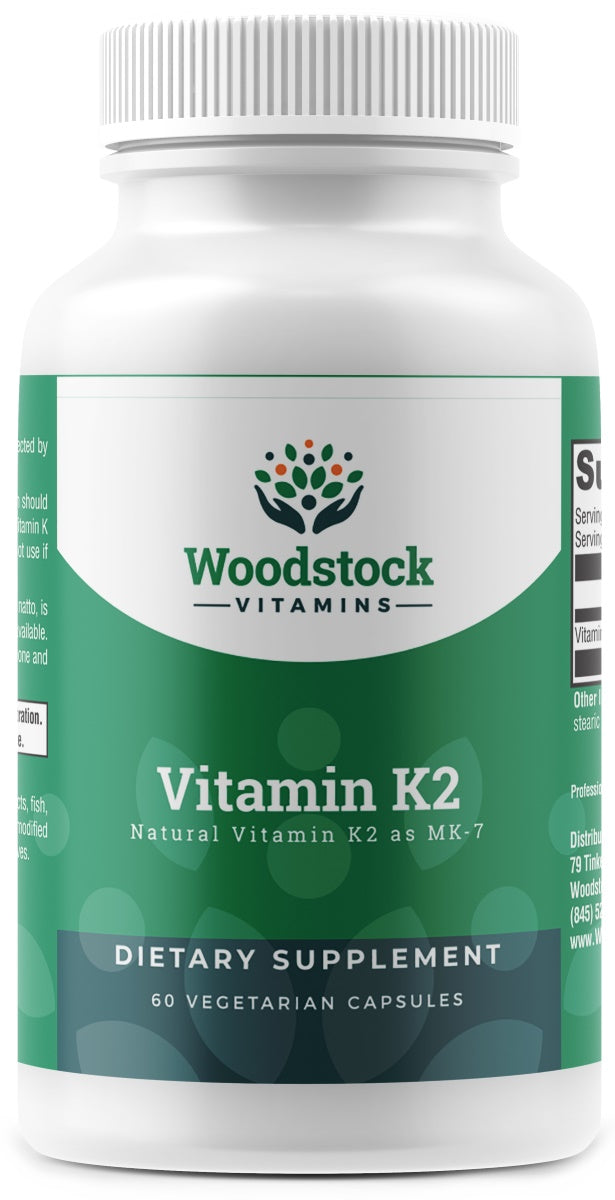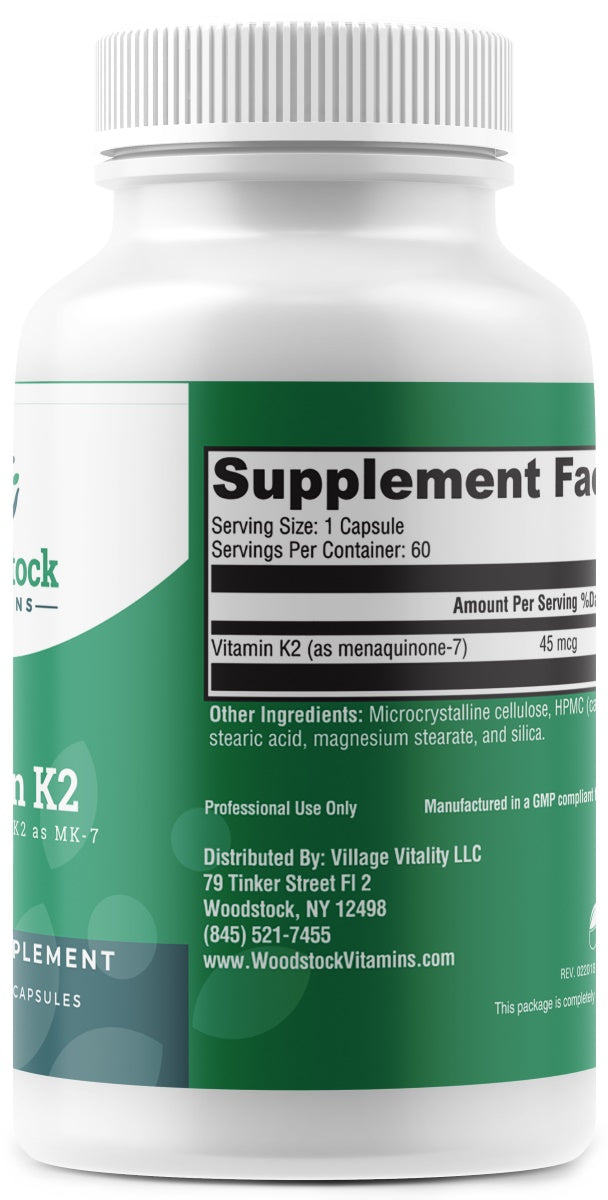
Are you the kind of supplement nut that has a cabinet overflowing with vitamins, minerals, and herbs? Well then, we’ve got some bad news: Your Vitamin K isn’t worth the space it’s taking up.
That’s right, you read that correctly — you don’t actually need a Vitamin K supplement.
Does that sound counterintuitive coming from us, the Woodstock Vitamins team? Don’t get us wrong, we think high-quality supplements are a great way to fill nutrient gaps and support your health. But let’s be real…Not all vitamins are worth the hype.
And when it comes to Vitamin K, most of what you’ve heard is all hype and no bite.
Vitamin K supplements have gained popularity in recent years, and especially during National Bone Health and Osteoporosis Month, we hear about its potential health benefits a lot. But does the average person need a Vitamin K supplement? Is it possible that a balanced diet can provide all the Vitamin K you need?
Before you start hoarding supplements, read on to learn the truth about Vitamin K supplements — when they’re necessary and when they’re a waste of money.
Here’s the deal: Vitamin K isn’t just one simple nutrient. The term actually refers to a specific family of vitamins.
The Vitamin K gang includes some heavy hitters, but the two you really need to know are Vitamin K1 (phylloquinone) and Vitamin K2 (menaquinone). These bad boys are fat-soluble and their health benefits pack a punch.

What is Vitamin K good for, you ask? Vitamin K plays a crucial role in creating proteins that are essential for some of our body’s most important processes. Think: blood clotting, bone formation, and even the prevention of artery hardening.
Learn More: Bone Health: Why We Always Recommend Calcium Hydroxyapatite
So Vitamin K is critical, and getting enough of it comes with a whole host of positive effects. If it’s not coming from a supplement with great branding, though, you’re probably wondering where you can get your hands on this Vitamin K goodness.
Lucky for you, there are plenty of tasty options to choose from.
Did you know that Vitamin K1 is the superstar nutrient that keeps your blood clotting like a pro? It’s true — this simple vitamin helps regulate the blood, control bleeding, and reduce blood loss after injuries.
The best part? You can find it in all your favorite green veggies! So, if you’re fond of salads or green smoothies, you’re in luck.
That’s right: If you’re a veggie enthusiast, or even just a mild fan, you’re probably already getting your daily dose of Vitamin K. For the fruity folks, it’s not as simple, but some crops like kiwi and grapes have small amounts.
So, load up on these leafy greens and get your Vitamin K1 fix:
Vitamin K2 is the more elusive of the two nutrients — it’s not nearly as common as its cousin, Vitamin K1. This mysterious vitamin is mostly synthesized by gut bacteria, so you won’t find it in a specific food group.
But fret not! You can track down Vitamin K2 in some delicious fermented foods and animal products:
While you’re chowing down, you can smile knowing your bones are happy and healthy — and not just the ones in your mouth! Vitamin K2 supports bone health by activating proteins that transport calcium to the right place.
Learn More: Calcium Doesn’t Work (Like You Think It Does)
So, whether you’re into lifting weights or just want to avoid bone loss as you age, this nutrient is your sidekick.
Annnnnnnd, here’s where we get to the unpopular opinion.
Dr. Neal — Woodstock Vitamins founder, practicing pharmacist of 20 years, holistic health advocate — firmly believes that Vitamin K is a fad supplement. Why?
The thing is, most people are getting enough Vitamin K through their diet already. It’s not like unicorn tears or dragon scales, it’s readily available in everyday foods.
Sometimes, we supplement not to improve something, but to prevent what can happen if we are deficient in that particular vitamin or mineral. And, that is the case with Vitamin K.
Yes, low dietary Vitamin K is associated with poor bone mineral density. And, yes, improving Vitamin K intake improves bone mineral density in people who have bone problems because of low Vitamin K intake.
But, have you ever heard the phrase “correlation does not equal causation”? That’s what’s happening here. Taking Vitamin K supplements won’t, unfortunately, give your bones the strength of a thousand suns.
In fact, it has been proven that supplementing dietary Vitamin K doesn’t actually do anything for bone mineral density.
So, taking Vitamin K doesn’t directly strengthen your bones. Rather, it can help prevent weakened bones because of a Vitamin K deficiency. Capiche?
If you’re worried about a deficiency, taking 45-90mcg of Vitamin K can act as an insurance policy. Think of it like a seatbelt. You wear it not because you expect to get into an accident, but just in case.
The insatiably curious Dr. Neal is known for turning the wellness industry on its head. His holistic framework for health — the boat-rocking Wellness Pyramid — takes into account the whole picture of your health.

Because, logically, we know that no part of the body functions inside a vacuum. So anything besides an all-encompassing, comprehensive approach doesn’t really make sense.
As it is with Vitamin K supplements.
Despite what you may have heard from evermore convincing marketing schemes, branding tactics, and influential influencers, supplements are not magic cure-alls. They’re helpful tools, instruments of prevention, and allies in the war against deficiencies.
Listen: The Supplement Quality Standard | Wellness Upside Down Podcast Ep. 24
But the core foundation of your health starts somewhere even closer to home. AKA, the bottom of the Wellness Pyramid, which focuses on optimizing the five lifestyle domains.
These lifestyle domains can be utilized to naturally increase your Vitamin K — no supplement needed!
If you want to get enough Vitamin K in your diet, it’s not rocket science. Just make sure you munch on some Vitamin K-rich foods. No need to embark on a wild goose chase.
But if you’ve got a gut feeling you need more Vitamin K, follow that impulse! Your gut is a bustling metropolis of Vitamin K2 factories, making the majority of what you need every day.
So if you want to keep the Vitamin K2 train chugging along, make sure you take care of your gut microbiome by eating plenty of fiber and fermented foods, while avoiding sugary and processed junk.
Sorry to burst your bubble, folks, but catching some Zzz’s won’t magically boost your Vitamin K levels. However, getting enough sleep can indirectly impact your Vitamin K game in some major ways.
For starters, a solid snooze session is key for a rock-solid immune system. Why does that matter? Well, staying healthy means you’re less likely to come down with an illness that could put a damper on your Vitamin K levels.
Plus, let’s not forget about the importance of a happy gut. After all, Vitamin K2 is synthesized by gut bacteria, so you want those little critters to be thriving. And guess what helps keep your gut happy? That’s right, quality sleep!
So hit the hay, folks, and let your body do its Vitamin K thing.
Let’s get moving and grooving! Regular exercise not only helps us feel better and sleep better, but it also promotes healthy blood clotting and improves circulation throughout the body.
When we hit the gym, our heart starts pumping and our blood vessels widen, allowing for better blood flow to our muscles and organs. This healthy circulation can also transport Vitamin K to different parts of the body where it’s needed the most, helping to keep our bones strong and healthy.
Stress is like a villain that’s always lurking around the corner, waiting to wreak havoc on our health. And when it comes to essential vitamins and minerals like Vitamin K, chronic stress can be a real scoundrel!
When we’re stressed, our body goes into overdrive, releasing hormones like cortisol that can mess with our digestion and absorption of nutrients like Vitamin K. It’s like our body is so focused on the stress that it forgets to properly digest and absorb the good stuff we need to stay healthy.
Plus, stress can also increase inflammation in the body, which can further interfere with the absorption and utilization of Vitamin K.
So, if you want to keep that sneaky antagonist at bay, your training should be centered on activities that directly combat stress: meditation, yoga, connection, breath work, and the like.
A good night’s sleep is the stress villain’s worst nightmare, too. It’s almost like all 5 of these lifestyle domains work congruently to create the foundation of your health!
Congratulations, you’re on the path to becoming a Vitamin K superstar! By following the tips we’ve shared, you’ll be able to boost your levels of this essential nutrient in no time.
But wait, there’s more! Did you know a little bit of sunshine could be the thing that takes your Vitamin K game to the next level?
When you expose your skin to sunlight, it can stimulate the production of Vitamin K2 in your body. So, don’t forget to soak up some rays (safely, of course) or consider popping a Vitamin D supplement to help your body produce more Vitamin K.
Just don’t forget your sunscreen, unless you want to risk looking like a ripe tomato.

You don’t have to love spinach as much as Popeye to get enough Vitamin K — thankfully, it’s found in many delicious foods.
However, there are certain groups of people who may be at risk of Vitamin K deficiency or who may benefit from a Vitamin K supplement.
These include individuals who:
Did you know that a Vitamin K deficiency can make you bleed like a character straight out of a horror movie? Okay, that might be a bit of an exaggeration.
But it can cause excessive bruising and some bleeding like bleeding gums, nosebleeds, and even heavy menstrual bleeding. Don’t worry too much, though. It’s relatively rare for healthy adults to experience this — only about 8-31% do.
Even if you aren’t currently deficient, you might consider a Vitamin K supplement to prevent further damage should you become deficient. And who are we to stop a fellow health-conscious icon?
If you’ve optimized your lifestyle domains and you’re still looking for a Vitamin K “insurance policy,” — we’ve got your back (and your blood vessels)! We, via Dr. Neal, recommend adding an additional 45-90mcg of Vitamin K through a Vitamin K supplement.
But you’ll probably notice that the majority of Vitamin K supplements use Vitamin K2 versus Vitamin K1. Why is that?
Well, K2 is the overachiever of the Vitamin K family, supporting bone health, cardiovascular health, and other essential bodily functions beyond just blood clotting. Plus, rumor has it that K2 supplements are more effective at raising blood levels compared to their K1 counterparts.



It is also pretty common to see Vitamin K supplements include Vitamin D3, so let’s do a little myth-busting.
Contrary to popular belief, you don’t need Vitamin D to absorb Vitamin K. It’s like thinking you need a fancy sports car to enjoy a drive through the countryside — nice, but unnecessary.
But! They do have complementary roles in the body. Vitamin D helps with the absorption of calcium from the gut, while Vitamin K helps to direct that calcium to the bones and teeth where it is needed.
Learn More: Vitamin D: Sunshine Supplement for Bones, Blood, and The Blues
It’s like a buddy system for your body — Vitamin D helps calcium in the door, and Vitamin K shows it where to go. That’s why combining Vitamin K and Vitamin D in a supplement can be a real power move for your overall health, especially when it comes to supporting bone health.



Whew! That was a lot of vitamin talk — are you OK? If you’re feeling overwhelmed, jump on a Counterside Consult with a supplement expert, free of charge.
It’s our humble promise to limit our supplement-related puns to blogs only — consults are strictly for strategizing your supplement game, sharing your concerns, and getting personal recommendations.

First 5
Shop
Peek behind the curtain of supplement industry misinformation and enjoy special promotions, podcast episodes, and our No-BS approach to holistic care, sent weekly.

We built the model for finding supplements that work for your wellness, your wallet, and the world. Learn More
Customer Service
Shop
Peek behind the curtain of supplement industry misinformation and enjoy special promotions, podcast episodes, and our No-BS approach to holistic care, sent weekly.

We built the model for finding supplements that work for your wellness, your wallet, and the world. Learn More
These statements have not been evaluated by the Food and Drug Administration. This product is not intended to diagnose, treat, cure or prevent any disease.
Use only as directed. Consult your healthcare provider before using supplements or providing supplements to children under the age of 18. The information provided hereinis intended for your general knowledge only and is not intended to be, nor is it, medical advice or a substitute for medical advice. If you have or suspect you have a specific medical condition or disease, please consult your healthcare provider.